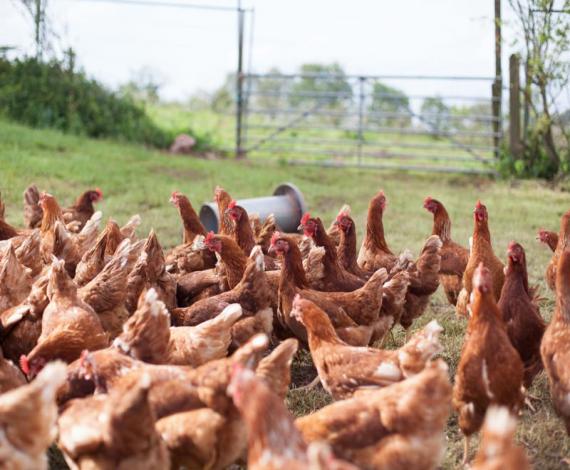What do you picture when you hear the words ‘free range’? Bright, spacious hen houses? Small flocks roaming on green pastures? If these are the sort of idyllic images that spring to mind, you’re not alone. Thanks to some well-publicised media campaigns in recent years, many people are now aware of the terrible suffering experienced by caged laying hens. Fewer people understand that free range, while better than caging, does not guarantee the highest standard of welfare for hens; nor the healthiest option for ourselves.
It is worth understanding the difference between free range and organic. Organic farming isn’t just about avoiding artificial chemicals; it’s a holistic ethos that encompasses a profound respect for our livestock as well as the land. Compassion in World Farming states that organic farms certified by the Soil Association offer the highest standards of animal welfare of any system. Many people choose to buy free range eggs with the best of intentions. However, only buying organic guarantees you a high welfare hen, and eggs that are free from chemical nasties.
Here are some of the ways that organic goes further than free range:
More space, fewer hens
Organic hens get 10m2 of pasture per bird. Inside the houses, a maximum density of 6 birds per m2 is permitted. Flocks can be no larger than 2000, and can be as low as 500.
Free range hens get less than half that amount of pasture per bird (4m2), and pack 50% more hens into the same living space (9 per m2). Their flocks can be any size; a single hangar can contain tens of thousands of hens.
Real freedom to roam
Organic farms must provide plenty of ‘pop holes’ (exits from the hen house) to ensure that their hens have easy and continuous access to the outdoors. The pasture is rested for at least 9 months between flocks to allow vegetation to grow back and prevent the build-up of disease in the soil.
Free range farms don’t have to provide a specific number of pop holes, and their pasture need only be rested for a meagre 2 months. This can leave free range hens with restricted access to a bare, muddy, parasite-ridden pasture. No wonder many so-called ‘free range’ birds spend little time outside.
No beak-trimming
Beak-trimming is commonplace in free range systems. To prevent stressed birds from pecking each other, the front third of chicks’ beaks are removed using infrared burners – without anaesthetic. The Soil Association strictly forbids this painful and mutilating practice.
No nasty surprises
Free range hens can routinely be fed anti-biotics to pre-empt illness, and are often given GM feeds.
Love your hens!
It seems like a no-brainer to us: happy hens lay better eggs – and eggs that you can feel better about eating. But how can you guarantee that your eggs come from hens that are well cared for?
Labels can be very misleading. Discerning buyers must wade through a sea of carefully crafted language (‘farm fresh’, ‘barn reared’, ‘corn fed’) and bucolic images that bear little relation to the reality of life behind the box. The only way to trust the ethical credentials of your egg is to trust the producer. That’s why Riverford has built close relationships with our organic egg farmers, Jerry Saunders and Duncan Janaway.
Wherever possible, Jerry and Duncan go above and beyond the Soil Association’s already rigorous standards. Their hens have a fantastic quality of life. They live in small flocks, and spend 365 days a year pottering freely on rich pasture. There is grass and clover for them to forage in, trees, shelters, and sand pits for scratching. The hens are encouraged to leave their houses each morning and engage in natural behaviours. They get plenty of human interaction, being checked on and chatted to throughout the day. Everything they’re fed is organic – including some of Riverford’s graded out veg!
Maintaining this high standard takes extra resources. By understanding this, and paying a little more for their eggs, our customers allow Jerry and Duncan to keep taking such good care of their birds. Hens are not machines; it’s not natural for them to produce eggs that are all completely uniform. By accepting mixed boxes that include the smaller eggs laid by younger hens and the larger, paler eggs laid by older ones, our customers prevent waste, and allow the hens to enjoy longer lives.
Choose organic
Of the 12.2 billion eggs eaten in this country in 2015, only two per cent were organic. We need to do better by our hens. For a truly ethical egg, please buy Soil Association-approved organic. Look for the SA’s label on the box: they audit every stage of the production process, so you can be confident in the quality of the eggs and the welfare behind them.










I have been a supporter of Compassion in World Farming for a good 30 years now, it’s great to see them get a mention here in your article as they work so hard & do so much good for all the farmed animals.